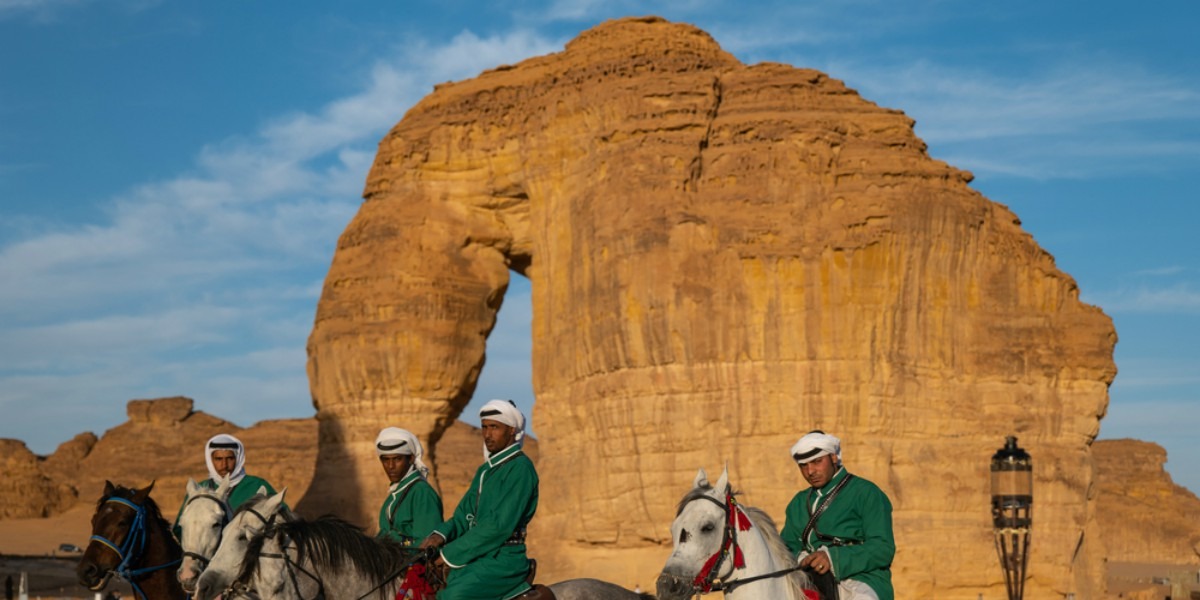Saudi Arabia back on tourism track with re-opening of AlUla heritage site and umrah for foreign pilgrims
Saudi Arabia is back on the tourism track after re-opening its borders following lockdowns and restrictions due to the COVID-19 pandemic.
The kingdom will welcome back umrah pilgrims from abroad from Nov 1 after suspension since the end of February. It also re-opened key heritage site AlUla at the end of October.
AlUla is a natural and human heritage site located in the governorate of Madinah in the north-west of Saudi Arabia. It is home to Hegra, the kingdom’s first UNESCO World Heritage Site. As part of plans to further develop AlUla, the resort The Sharaan by Jean Nouvel is scheduled to be completed by 2024. Plans for the resort, by the same architect who designed Louvre Abu Dhabi, were first revealed in August last year when it was scheduled for a 2023 completion.
The resort’s 40 guest suites and three villas will sit in the recently-opened Sharaan Nature Reserve. A retreat summit centre nearby will provide 14 private pavilions. Saudi authorities consider the resort a key element of the Royal Commission for AlUla’s strategy to develop the area as a global destination for culture, heritage, and eco-tourism. They expect the whole site to attract two million visitors annually by 2035.
At the same time, Khalid Al-Falih, Minister of Investment, iterated plans to increase the number of religious visitors at the Future Hospitality summit on Oct 27.
“The [pilgrimage] demand and the waiting lists around the world are huge,” Khalid Al-Falih acknowledged when asked about building out Makkah and Madinah. “There are people who spend their lifetime waiting for the opportunity to visit,” he added. “So, we're going to open it up.”
This is an undertaking the Kingdom promised four years ago. “By increasing the capacity and by improving the quality of the services offered to umrah visitors, we will, by 2020, make it possible for over 15 million Muslims per year to perform umrah and be completely satisfied with their pilgrimage experience,” says the Vision 2030 website documents that were released in 2016.
Saudi’s Vision 2030 is a framework to reform Saudi Arabia’s socio-economic strategy to reduce the kingdom’s reliance on hydrocarbons.
“Not only are the numbers going to increase, we're going to improve the quality of the experience of umrah,” Al-Falih repeated at the conference this week. “Any umrah visitor will be extended a long-term visa when they can experience the kingdom and see additional sights and enjoy our beautiful country,” he added.
Saudi authorities hope pilgrims will take advantage of the extended time in the country to visit tourist sites. According to the Ministry of Hajj and Umrah, currently an umrah visa is valid for 30 days for most pilgrims. However, it requires the departure from Saudi Arabia within two weeks of the entry date, unlike the one-year, multiple entry eVisa allowing international tourists up to 90 days in the country.
AMBITIONS
“We are aiming to move Saudi Arabia from the twenty-second visited destination in 2019 to place among the top five by 2030, with all the plans we have,” Ahmed Aqeel Al-Khateeb, the Minister of Tourism, said on Oct 26 in his Future Hospitality Summit opening remarks.
Saudi Arabia plans to boost visitor numbers from about 20 to 100 million, of which three quarters will be international arrivals. The investment ministry expects tourism’s contribution to national GDP to grow from three to ten percent within the next ten years.
According to the World Travel & Tourism Council (WTTC), Saudi Arabia was the fastest developing country in the Middle East and leading economies globally in 2019, growing by 14%.
“From now to 2030, Saudi Arabia is investing billions of dollars in developing destinations,” the Minister of Tourism said.
Having spent a travel and tourism capital of $38 billion in 2019, the fifth-highest globally, the Kingdom’s Tourism Development Fund launched in June 2020 with an initial worth of $4 billion (SR15 billion).
Saudi Arabia seeks increased foreign investment and international private sector participation in its economy to help it meet its Vision 2030 goals.
INVESTMENT
“Tourism will be a prime sector where the government would step back and allow the private sector to do their thing, invest, operate, bring customers and revenue and make money,” Minister of Investment Khalid Al-Falih said during the hospitality summit.
The Ministry plans to address potential investor concerns about not understanding the investment landscape and ecosystem by providing stability for the regulatory environment.
“Today, as we speak, we have 27 laws and regulations that are being shared through public consultation with the private sector before we enact,” Al-Falih commented. “These are part of the reforms we're undertaking, and that is a continuous process.”
Special economic zones effective in addressing international investors' needs and providing a level playing field represent additional instruments the Ministry of Investment will use to press ahead.
“It's an exciting journey, and I think it takes very little effort to sell the opportunity to our partners.”
(Reporting by Petra Loho; Editing by Emmy Abdul Alim [email protected])
© SalaamGateway.com 2020 All Rights Reserved
